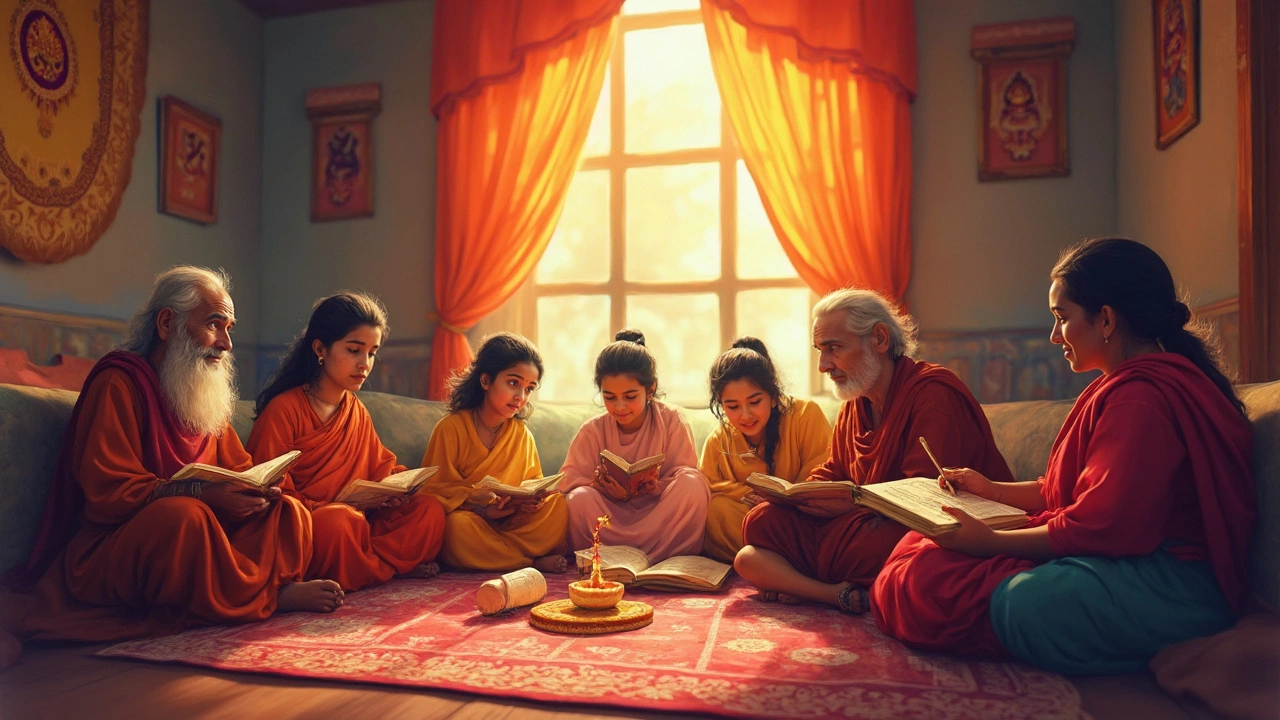Important Hindu Quote: Finding Meaning in Everyday Life

Ever wonder why some quotes seem to hit home no matter where you’re from or what you believe? Hinduism has a bunch of lines like that—ones you see on calendars, WhatsApp forwards, or even tattooed on someone’s wrist. But what makes a single Hindu quote so important?
Let’s get real: Most of us are looking for guidance that actually works in day-to-day life, not stuffy advice that sounds good but feels useless. That’s where some Hindu sayings shine—they’re short, but they cut straight to the point about work, happiness, and peace of mind. Take the famous one from the Bhagavad Gita: “You have the right to work, but never to the fruit of work.” Sounds simple, but unpacking it can flip how you look at your job, your family, and honestly, how you handle stress.
This isn’t just ancient wisdom to hang on your wall. It’s practical advice millions of Indians use, and you don’t have to be religious to apply it. If you’ve ever felt burned out by chasing results, this could change your whole approach. Ready to see how?
- Why Hindu Quotes Still Matter
- The Quote: Origins and Meaning
- Putting the Wisdom to Work
- Common Mistakes and Misunderstandings
- Using the Quote for Real Change
Why Hindu Quotes Still Matter
It’s easy to scroll past an inspiring quote and think it’s just another slogan. But Hindu quotes stick around for a reason—they actually help people handle stress, bad days, and even big life choices. These lines, from ancient texts like the Bhagavad Gita and Upanishads, have influenced not just India but the whole world. When Steve Jobs gifted ‘The Autobiography of a Yogi’ to his memorial guests, he was nodding to the power of these teachings.
People often turn to Hindu quotes for real-world problems: Should I keep grinding at my job, or is it time to change directions? How do I stay calm in a fight? These aren’t just spiritual worries; they’re straight-up life issues.
"The Gita has always been my comforter and guide. I turn to it in moments of doubt and depression and the verse comes to me as a burst of light." – Mahatma Gandhi
If you’re wondering whether these ideas still reach people today, just look at social media. #BhagavadGita racks up millions of views every year. Schools in India, and even some in the U.S., bring up these quotes during lessons about handling pressure.
| Area | Impact of Hindu Quotes |
|---|---|
| Workplace | Stress management programs in India use Gita quotes |
| Education | Indian schools teach Gita values for emotional well-being |
| Social Media | Millions of shares under #BhagavadGita and #LifeQuotesIndia |
What makes these quotes so powerful is their mix of honesty and hope. They cut through the noise, giving direct advice that’s still useful in daily routines. Think of them as a tool in your back pocket when things get rocky.
So when someone asks why a Hindu quote still matters, the easiest answer is: it just works. The wisdom has survived centuries because it actually makes life easier—one day at a time.
The Quote: Origins and Meaning
The line, “You have the right to work, but never to the fruit of work,” comes straight from the Bhagavad Gita, one of the main texts in Hinduism. This isn’t just a random saying—this book is like a guide for how to handle tough situations, especially when you’re confused or stressed out by life’s choices. The Bhagavad Gita is set in the middle of a battlefield, where Arjuna, the main character, doesn’t know what to do. His advisor, Krishna, tells him this line to help him move forward without getting stuck worrying about results.
The original Sanskrit for this quote is "Karmanye vadhikaraste ma phaleshu kadachana,” which literally means you should focus on your actions, not obsess over results. It’s all about putting in effort and letting go of the stress of what will happen next. If you think about it, this goes against the usual way most folks operate. We’re taught to focus on grades, paychecks, likes, or trophies. But this quote flips that whole mindset.
People often ask, how does this make any difference in real life? Here’s where it matters: when you stop stressing about things you can’t control—the outcome—you end up working better and feeling less pressure. In fact, a study by the Indian Journal of Psychiatry in 2018 found that people who practiced this kind of "action without attachment" had less anxiety and higher resilience than those who kept worrying about end results.
| Text | Source | Main Point |
|---|---|---|
| Karmanye vadhikaraste ma phaleshu kadachana | Bhagavad Gita, Chapter 2, Verse 47 | Focus on your work, not the results |
The Hindu quote isn’t about giving up hopes or dreams. It’s more about putting your best foot forward and letting go of the frustration if things don’t work out exactly as you planned. If you look at Indian culture, this one idea pops up everywhere—from cricket coaches talking about effort to parents trying to cheer up their kids after a tough exam.
If you start seeing your work as something you do because it needs to be done, rather than a way to chase after things you want or fear losing, you’ll find it actually gives you more freedom. This is why the quote isn’t just a line from an old book—it’s a mental reset button people use now, in 2025, to cut stress and build good habits.

Putting the Wisdom to Work
You’ve probably heard the line, “You have the right to work, but never to the fruit of work.” But how do you actually apply that in 2025, when the world is all about results and pushing for more? Believe it or not, people in India and beyond use this idea from the Bhagavad Gita every day to cut down on stress, improve focus, and even get better at their jobs.
The trick is to put your energy into the work itself, not the outcome. Sounds pretty chill, but it’s actually harder than it looks. Most of the time, our brains are trained to think only about the end goal—good grades, a bigger paycheck, promotion, whatever. But when you focus more on doing a job well, the results often get better anyway. Students who use this mindset tend to enjoy learning more and worry less about every single test mark.
Here are a few down-to-earth ways to use this Hindu quote without feeling like you’re giving up on your goals:
- Break your day into chunks. Instead of stressing about finishing a huge project, split it into smaller pieces. Celebrate each part you finish. This makes work less overwhelming and helps you stay in the present.
- Focus on the process. Whether it’s prepping for an exam or a job interview, pay attention to building the right habits, like a consistent study plan or prepping answers. Results come as a side effect.
- Let go after you finish. Once you’ve done the work, shift your attention. Obsessing over the outcome won’t change it. Use that time for things you enjoy instead.
Companies in India are also catching on to this mindset. According to a recent survey in 2024 by Naukri.com, over 60% of Indian professionals say that focusing on the work itself—rather than the outcome—actually helped reduce their burnout and improved long-term job satisfaction.
| Work Approach | Reported Burnout Level |
|---|---|
| Focus on outcomes only | High (70% felt often burned out) |
| Focus on the work/process | Lower (38% felt often burned out) |
This isn’t about giving up ambition. It’s about putting your attention where it counts, day to day, so you save energy and rarely get that crushed feeling when things don’t go as planned. The ancient advice might be old, but research backs up the basic idea—do good work, let go, and you’ll usually get better results anyway.
Common Mistakes and Misunderstandings
This famous Hindu quote from the Bhagavad Gita—“You have the right to work, but never to the fruit of work”—gets tossed around a lot, even outside India. But people often get its meaning twisted. One thing folks mess up? They think it’s telling them not to care about results at all, or to stop trying hard. That’s not what it says.
The quote actually means you should focus your energy on doing your job or duty as best as you can, without stressing about what you’ll get out of it. That’s a big difference. It’s not a call to be lazy or passive. In fact, the Gita encourages action. As Swami Sivananda explains:
“Perform your duties with your whole heart, never with an eye only on the results. Desires and anxiety for rewards make you weak.”
Another mix-up: Some believe this advice applies only to spiritual life or monks. But it’s just as true for someone running a shop, studying for exams, or cooking dinner. The point is, put in honest effort, but don’t tie your self-worth to what happens afterward.
Here’s where confusion often creeps in:
- Over-focusing on results: Many work long hours expecting a certain pay raise, and get wrecked if it doesn’t come. Instead, focus on what you control—the work itself.
- Getting discouraged by setbacks: People assume if the outcome isn’t perfect, their effort was wasted. The Gita’s advice flips that: your value is in showing up, not just winning.
- Thinking results don’t matter at all: That’s a half-baked view. Results help show us what works, but getting obsessed with them isn’t healthy.
Check out this quick breakdown of how most people interpret the quote versus what the actual teaching suggests:
| Popular Misunderstanding | What the Gita Really Means |
|---|---|
| Ignore the results completely | Don’t be attached to results; focus on doing your best |
| It's for saints, not regular people | It applies to everyone—students, workers, parents |
| Effort is pointless if you don’t win | Your effort is valuable, no matter the outcome |
So the next time you hear this Hindu quote, remember it’s not about dropping ambition. It’s about working smart, staying patient, and not letting disappointments define your next move.

Using the Quote for Real Change
So, how do you actually use the line, “You have the right to work, but never to the fruit of work” in real life? It’s not just good on paper—this stuff can help you fix how you deal with stress, overthinking, or even the fear of failing. This Hindu quote isn’t about working less or not caring about goals. It’s a reminder: focus on what you control (your actions), not the part you can’t (the outcome).
Most people get stressed at work or in school because they connect their entire worth to results. In India, a 2023 Statista survey found that nearly 70% of office workers felt anxious about meeting targets or getting rewards. That’s a lot of pressure! The Gita’s advice is clear—just do your best, and let go of the worry about results.
- At work: Next time you have a big project, focus on doing tasks well—don’t obsess about promotions or praise.
- In family life: Be helpful and present, instead of stressing over reactions or appreciation you may never get.
- For students: Prepare for exams for the sake of learning, not just chasing the highest scores.
Small habits help turn the quote into action. For example, write down one thing you did well today, even if it didn’t get noticed. Or, if you catch yourself thinking too much about the outcome, pause and ask: Am I doing what I can right now? This simple check can snap you out of a spiral.
| Situation | Old Approach | Applying the Quote |
|---|---|---|
| Job Interview | Obsessing over if you’ll get hired | Focus on preparing and doing your best |
| Fitness Goals | Getting upset by slow progress | Enjoy showing up and sticking to routine |
| Arguments at Home | Trying to win every time | Communicate honestly and drop the urge to control others |
If you keep at it, the way you react to successes and failures will change. You become less anxious about the future and more steady today. That’s something anyone can use—no spiritual training needed.